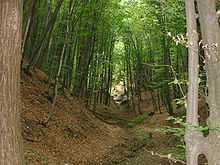Codri
| Moldavian Plateau | |
| Topography | |
|
Bukovinian Subcarpathians Suceava Plateau Bugeac Plain | |
| Hydrography | |
|
Danube |
|
| Climate | |
| Flora & Fauna | |
|
Flora of Romania |

Codri (plural; also sometimes singular Codru) is the name of the forests that grow in the hilly part of Moldova.
During the Middle Ages most of Principality of Moldavia's hills were forested, and the forested area in general was referred to as Codri, with bigger regional forests often given names such as Codrii Cosminului (Cosmin Codri), Codrii Plonini (Plonini Codri), Codrii Hotinului (Hotin Codri; also Pădurea Hotinului, Hotin Forrest), Codrii Orheiului (Orhei Codri), Codrii Lăpuşnei (Lăpuşna Codri).
Although the hills represent about 80%–90% of the territory Moldova, the forested area has decreased after 1800 due to intensive agriculture of the fertile land to about 12%. Despite the fact that there are still several big forests that have been preserved, including some designated as national parks, the country currently suffers from acute insufficiency of forests (with respect to its normal ecology), translated into poorer and less water for human and irrigation use.
These uplands are interlaced by deep, flat valleys, ravines, and landslide-scoured depressions separated by sharp ridges. Steep, forest-clad slopes account for much of the Codri.
The highest point in Moldova, Bălăneşti Hill (Dealul Bălăneşti; 429 m or 1,407 ft) is located in the Corneşti Hills, located between Prut and Răut rivers, in the core Codri area.